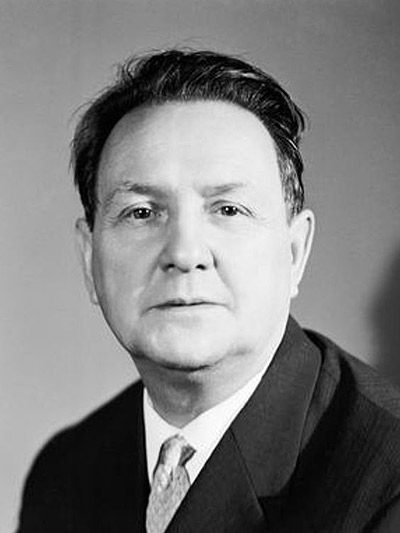presents
 Markov, Georgi Mokeevich. Born on 19 April 1911, near Tomsk, Siberia. He authored the
novels Strogovi, Father and Son, Salt of the Earth,
Siberia, and To The Future Age.
Markov, Georgi Mokeevich. Born on 19 April 1911, near Tomsk, Siberia. He authored the
novels Strogovi, Father and Son, Salt of the Earth,
Siberia, and To The Future Age. The first chapters of the novel Strogovi, which chronicles the adjustments of Siberian peasants to the new Soviet power, were published in the almanac "Novaya Sibir" and elicited an extremely hostile reaction from the central press. Literaturnoye Obozreniye denounced them, saying "Markov writes with the impudence of a villiage hooligan." One of Markov's early defenders, however, was the Siberian poet Ivan Ivanovich Molchanov-Sibirsky. In October 1958, as one of the secretaries of the Writers Union, he gave a report to the Presidium, demanding Pasternak's ouster from the Union following his winning the Nobel Prize. By 1967 he had obviously outgrown the "village hooligan" label. He was an active participant in the crackdown at the Writers Congress of that year. In 1969 he was among those voting to kick Solzhenitsyn out of the Writers Union. "Siberia" was published in two parts in the journal Znamya; Part One in 1971 (issues No. 3-4), and Part Two in 1973 (issues No. 6-7). He was made First Secretary of the Writers Union on 20 July 1971. He enjoyed an unusually warm relationship with Leonid Brezhnev. On 25 February 1976, at the 25th Party Congress, he began his remarks thusly: "The deep, wise report of Comrade Leonid Ilych Brezhnev, suffused with a Leninist analysis of the contemporary world, contains a gigantic, immeasurable energy of inspiration. As if along wires, this energy has jolted into the hearts of people, inspiring them to work and great achievements." In April 1979 he personally gave Leonid Brezhnev the Lenin Prize for Literature for Brezhnev's books Malaya Zemlya, Rebirth, and Virgin Land, saying that these works "had an enormous influence on all types and genres of literature". It was during his tenure as head of the Writers Union that the Central Committee issued its decree of 8 October 1979 "On the Responsibility of Chief Editors for the Ideological and Artistic Content of Works Published." In the 1980s, a statue of Markov was erected in his Siberian home town and small museum dedicated to his life and works was opened. Between 1981 and 1985 print runs of Markov's works were 4,129,000. In 1986, his final novel, "To The Future Age", appeared in Zhamya. The prototype for the positive hero of this novel was Politburo member Egor Ligachev during the time he worked as a Party Secretary in the Tomsk Oblast. At the Party Congress in March 1986, Markov said he did not see the need for more glasnost in Soviet society. At a press conference, he opposed publishing "Dr. Zhivago". In June of 1986, he retired from the post of First Secretary of the Writers Union. In September 1991, a Polish newspaper published a story on the Bulgarian dissident Georgi Markov, who was supposedly killed in London with a poisoned umbrella. They mistakenly accompanied the article with a picutre of our Georgy Markov, the Soviet writer. The newspaper, of course, published an apology and, strange as it may seem, a few days later, Georgy Mokeevich Markov died. During his lifetime, he was awarded the Hero of Socialist Labor medal. |